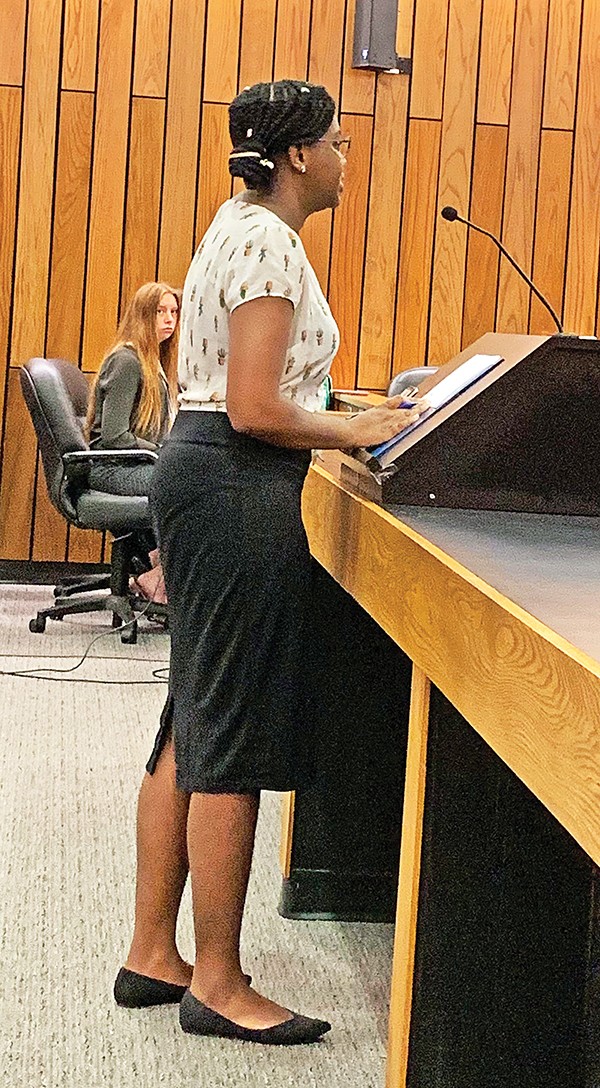Despite some wishful advance indications that the county government’s division over funding the University of Memphis swimming facility (“natatorium,” in officialese) would end in some de facto kumbaya, the resolution of things on Monday — with the expected near-unanimous override by the Shelby County Commission of Mayor Lee Harris‘ veto — left some nagging questions on all sides.
The university got the $1 million county contribution that would keep the natatorium on course to completion, and former Commissioner George Chism made a case for the advantages of the facility for needy youngsters in Shelby County without current access to a pool.
But the university — as evidenced in the testimony Monday of Ted Townsend, its chief for economic development and government relations — was no closer to having a definitive target date for a $15-an-hour minimum wage for all its employees than it was at the time of the veto that the mayor imposed two weekends ago at the behest of various union and activist groups.
 Jackson Baker
Jackson Baker
Union rep Webster: “To this day nobody has seen a time frame:”
Townsend, affirming that “we are all focused on attaining a living wage,” contended that a fixed date for imposing a universal $15-an-hour standard was difficult because future state contributions to the university were unpredictable, as were enrollment figures. He made a case that the existence of employee benefits could equate to a de facto $16.82 income package.
Jayanni Webster of United Campus Workers, to whom Harris deferred in lieu of remarks of his own, would have none of Townsend’s arguments. She pointed out that women and blacks constituted a disproportionate segment of the 300-odd employees paid less than the $15 hourly figure and said the workers’ “seven-and-a-half years of fighting for a living wage” had been ignored by the university. “You cannot eat benefits or pay your light bill with benefits,” she said, noting, apropos the university’s claimed intentions, “To this day, nobody has seen a time frame.”
Similar arguments were made by Democratic Commissioner Tami Sawyer, a candidate for Memphis mayor, who turned out to be the sole defender of Harris’ veto. She pointed out the discrepancy between University President M. David Rudd‘s $200,000 annual salary and the wages of the university employees making less than $15 an hour. Sawyer was scornful of the university’s promises that “maybe in four to six to eight years” their pay situation would be remedied.
Other Democratic commission members made it clear that their sympathies lay with the workers but suggested that other factors led to their inability to uphold Harris’ veto. Eddie Jones said, “I’ve never voted against unions, but in this instance there was another way to do this before we get to a veto.” Alluding to former County Mayor Mark Luttrell‘s several vetoes of commission actions, all of which were subject to overrides, Jones said, “The last mayor tried it, and it didn’t work so well for him. I would prefer to see if we could work this thing out.”
Commissioner Reginald Milton spoke of “a cast of characters with well-meaning intentions,” including in that definition “the mayor, the county commission, and the university.” Calling for continued dialogue between the various parties, he said, “I will vote to override but will make sure that promises will be fulfilled.”
Commission chairman Van Turner foresaw a period of continued negotiation that would end in agreement with the university. Hopeful for change, Turner cited the memory of his father, who had been among the first African-American students to desegregate the university back in the early 1960s, a time, said Turner, when communication between whites and blacks was at a minimum.
Harris, who had largely left discussion to others, re-entered the debate to say that, while he had always enjoyed good communication with the commission, things were “not so good” with the university.
They were not exactly perfect with the commission, either. Commissioner Edmund Ford Jr., a persistent foe, released copies of a letter he had directed to Assistant County Attorney Marcy Ingram, asking for a ruling on whether Harris had, as university President Rudd suggested two weeks ago, committed an ethical breach by appearing to bargain with Rudd on the basis of a quid pro quo.
In the end, the 12-1 veto override vote spoke for itself.